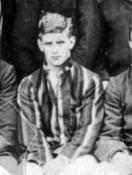
War Memorial
| Captain Colin Donald MCIVER | |
|
2/4th Battalion Queen’s (Royal West Surrey) Regiment and Royal Air Force Date of birth: 23rd January 1881 Date of death: 13th May 1954 Died aged 73 Unknown |

|
| Colin Donald McIver was born in Hong Kong on the 23rd of January 1881 the son of Alexander McIver, a gentleman. He was educated at Hazelwood School until December 1892 when he left due to a family bereavement at the age of 11. He later went on to Forest School, at Woodford in Essex until July 1901 where he was a member of the Cricket XI from 1897 to 1901 being Captain from 1899 to 1901. He topped the batting averages in 1900, with an average of 31. The Forest School magazine wrote the following on his 1900 season: - “Is a really good bat, playing very correct cricket all round the wicket, with a splendid stroke off his legs. Has kept wicket well and captained the side with excellent judgment.” In the 1901 season he scored 1,003 runs for the school at an average of 100.3, a school record. The school magazine wrote of his 1901 season: - “A really first-class bat, with beautiful strokes all round the wicket. A fair bowler and wicket-keeper. Has made an excellent captain; his place will be most hard to fill.” He was a member of the Football XI from 1897 to 1901 where he played at centre half. The school magazine wrote of his season: - “Has a good command of the ball, shoots well, and combines well with Guy; should make a “class” player.” He served as a member of the school Cadet Corps from September 1898 and was promoted to Corporal in September 1899. He was appointed as School Monitor in 1899, was a member of the Games Committee from 1898 and was Vice President of the Debating Society in the same year. He played cricket for Essex County 2nd XI from 1902 to 1934. He went on to Hertford College Oxford in September 1901 and went on the Casuals Public School Football Tour at Christmas 1901. At the end of his first term at Oxford the following appeared in the Forest School magazine on his progress: - “C.D. McIver came up this term, and we know well how much you have lost and we gained by his appearance here. His reputation had preceded him, but he very soon gave proofs of its truth. One line quoted from the “Sportsman’s” account of the Freshers match will show this, “McIver was the best forward on the field.” Since then he has played regularly for the Varsity up to the last two matches. He is going on the Casuals’ Christmas tour, and next term we have great hopes that he will get the much coveted “blue”. But not only at soccer has he shone. He has also distinguished himself at Hockey in North Oxford, and by dint of hard training he got two seconds in his College Sports – for the High Jump and Freshers’ 200 Yards Race, won in 25 secs.! He has very great chances of a double – he might get a triple Blue. He represented the University at cricket and received a Blue in the summer of 1903, when he scored 60 against Cambridge, and a Blue for Football in 1903/4. On the 1st of November 1906 he represented the Amateurs of England against France at football and played regularly for Corinthian Casuals AFC , who he toured South Africa with in 1903. He also played county football for Essex. In 1913 he represented Essex at cricket and set a county record for the first wicket of 210-1. In a first class career stretching from 1902 to 1934 he scored 4,651 first class runs at an average of 22.25. He also represented the MCC. He was a director of the Universities and Public Schools Athletic Club in 1911. He was married t St Margaret’s Church, Westminster to Ethel Agnes (nee Lambert) a on the 4th of June 1907, followed by a reception at the Westminster Place Hotel; they had a daughter, Marjorie Jean, born in 1908, and a son, Richard Colin, born on the 22nd of January 1918. In 1911 the family was living at "Scourie", Oakfield Road in Ashtead but by 1918 they were living at "Ardlee" in the same road. He worked as a Partner with Bridges, Routh & Co, wine merchants of St Michael’s House, St Michael’s Alley, Cornhill in the City of London. The partnership was dissolved on the 17th of June 1921. On the outbreak of war he enlisted at Dukes Road, Euston Road on the 2nd of September 1914 as Private 2077 in the 28th (County of London) Battalion (Artists Rifles). At a medical examination, which was held on the same day, it was recorded that he was five feet ten inches tall and that he had a fair complexion, blue eyes and fair hair. He applied for a commission in the 4th Battalion Queen’s (Royal West Surrey) Regiment on the 12th of January 1915 and was commissioned as a 2nd Lieutenant in the 2/4th Battalion on the 9th of February 1915. He sailed with his battalion from Devonport on the 17th of July 1915 on board HMT “Ulysses” and disembarked at Suvla Bay, Gallipoli on the 9th of August 1915 between 2.30 am and 5.30am. At 6.40am they received urgent orders to advance towards the position known as Chocolate Hill. As they advanced to the south east of the salt lake they came under shell fire and suffered a number of casualties. When they arrived at the base of Chocolate Hill they were moved forward in support of the rest of the brigade but came under fire from their own artillery and fell back. They went forward again but one again they had to withdraw due to British artillery fire and the scrub being on fire. During this abortive attack, Colin McIver was wounded but, in spite of his wounds and of the burning scrub all around he carried his severely wounded servant, Private Fuller, on his back to the dressing station. He was admitted to 35 Field Ambulance suffering from gunshot wounds to the right leg and was evacuated to Mudros where he was admitted to 16 Stationary Hospital on the 11th of August. He was transferred to 24 Casualty Clearing Station on the 13th of August and was discharged to duty from their Convalescence Department on the 30th of August 1915; he rejoined his battalion the following day. On the 15th of September 1915 he was admitted to 1st (Welsh) Field Ambulance suffering from dysentery and returned to duty on the 20th of September, the same day as he was promoted to Captain while in command of a Company. He embarked at Suvla Bay on the 13th of December 1915 and disembarked at Alexandria on the 19th of December where he went into camp at Wardan. On the 17th of January 1916 he was admitted to the Anglo-American Hospital at Cairo suffering from jaundice and returned to duty on the 7th of February. On the 30th of July 1916 he was admitted to 1st (Welsh) Field Ambulance at Ferry Post suffering from dysentery and was transferred to No. 1 Australian Hospital at Ismailia with diarrhoea. He was later transferred to 10 Red Cross Hospital after which he was granted five weeks leave to England. He embarked on board the SS Malwa at Port Said on the 26th of August 1916 and landed at Folkestone on the 1st of September. A Medical Board was convened at Caxton Hall on the 27th of September 1916 to consider his case: - "Following 5 months served in Gallipoli and nine months in Egypt this officer contracted dysentery. He is still suffering acute diarrhoea and is in need of rest and treatment. Unfit three months." On the 24th of April 1917 he was passed as fit for home service by a Medical Board which sat at the Horton (County of London) War Hospital, Epsom and was posted to the 4th Battalion of his regiment at Tunbridge Wells. After a long recovery he was passed as fit for general service at a Medical Board which took place at Tunbridge Wells on the 14th of June 1917. He later transferred to the Royal Air Force, joining No. 1 School of Aeronautics at Reading on the 26th of June 1918. He was passed as fit to fly on the 25th of September 1918 and re-joined No. 1 School of Aeronautics the same day where he was placed on light duties. He returned to the Queen's (Royal West Surrey) Regiment when he joined the 3rd (Reserve) Battalion at Sittingbourne on the 5th of February 1919. He was demobilised at the Officer's Dispersal Unit, London on the 28th of March 1919. He attended a parade of former members of his battalion at a church service at Croydon on the 16th of November 1930. From the late 1920s/early 1930s the family lived at 3 Meadow Road, Ashtead. He was a member of Ashtead Cricket Club from 1908 and would bring a strong side to play the village team each year for the Groundsman's Benefit match. In his later years he coached the Colts team. There is a memorial to him at the Woodfield Lane ground in Ashtead. By 1939 he had moved to “Hill Top”, West Penwith in Cornwall where he worked as a wine merchant. He died at Worcester College Oxford. |
|
| Went on to Forest School |
Back